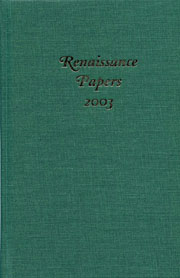Book contents
- Frontmatter
- Contents
- Renaissance Papers
- Homer, Erasmus, and the Problem of Strife
- William Tyndale Among the Demons
- The Printing of “this written book”: G.T. and H.W.'s Editorial Disputes in The Adventures of Master F.J.
- George Puttenham as Comedic Artificer
- Amoret and Scudamour Woo and Wed: Two Courtly Histories and a Stalemate
- Strange Bedfellows: “The Churching of Women” and The Taming of the Shrew
- “Romans, countrymen, and lovers”: Performing Politics, Sovereign Amity and Masculinity in Julius Caesar
- “Rouse Up a Brave Mind”: The Merchant of Venice and Social Uprising in the 1590s
- Revenge Tragedy and Elizabeth Cary's Mariam
- “very worthely sett in printe”: Writing the Virginia Company of London
The Printing of “this written book”: G.T. and H.W.'s Editorial Disputes in The Adventures of Master F.J.
Published online by Cambridge University Press: 12 September 2012
- Frontmatter
- Contents
- Renaissance Papers
- Homer, Erasmus, and the Problem of Strife
- William Tyndale Among the Demons
- The Printing of “this written book”: G.T. and H.W.'s Editorial Disputes in The Adventures of Master F.J.
- George Puttenham as Comedic Artificer
- Amoret and Scudamour Woo and Wed: Two Courtly Histories and a Stalemate
- Strange Bedfellows: “The Churching of Women” and The Taming of the Shrew
- “Romans, countrymen, and lovers”: Performing Politics, Sovereign Amity and Masculinity in Julius Caesar
- “Rouse Up a Brave Mind”: The Merchant of Venice and Social Uprising in the 1590s
- Revenge Tragedy and Elizabeth Cary's Mariam
- “very worthely sett in printe”: Writing the Virginia Company of London
Summary
Twentieth-century critics of George Gascoigne's The Adventures of Master F.J. have frequently, and properly I believe, focused much of their energy on explicating the ambiguous position of the intrusive and garrulous G.T. in his multiple roles as editor, narrator, critic, and moralist. One of the more fruitful turns in Master F.J. criticism, in fact, came in the 1940s when critics began seriously to regard the putative “editor,” G.T., as a character in his own right and therefore a compelling site for talking about narration; for how we position G.T. determines, perhaps more than any other single aspect, how we read this work altogether. While G.T.'s own enterprise seems to be satirizing the codes of courtly love so disastrously practiced by F.J., he simultaneously sets himself up as a target of satire for Gascoigne and his readers. If we choose, then, not to question the authority or motive of our narrator, we may privilege the events of the narration itself and can focus chiefly on the characters and on tracing the lines of moral consequences of their actions. If we acknowledge G.T.'s presence and grant him his supposed editorial status, then he becomes our Elizabethan aesthetician, and we can read Master F.J. either with historical or aesthetic interest. If, however, we back away, outside G.T.'s own frame, then we can see him as critics most often do now, as the most important actor in the narration. Suddenly, the narration becomes very self-conscious, a very modern-seeming meta-narrative.
- Type
- Chapter
- Information
- Renaissance Papers 2003 , pp. 45 - 54Publisher: Boydell & BrewerPrint publication year: 2004



